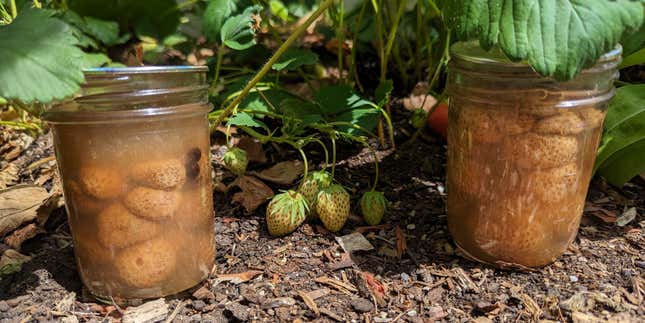I hate picking strawberries. I love the berries themselves, and I romanticize picking them every year until I’m there, crouched on the ground, reminded of my age and proclivity for back pain as I aggressively flip over leaves looking for ripe berries. I used to get angry at the green, unripe berries—at their audacity—until someone introduced me to pickled green strawberries.
Perhaps you grow strawberries at home (you should; they’re perennial so they’ll come back every year and multiply like mad, while requiring little upkeep), or maybe you prefer a U-pick situation. In any case, it’s as easy as picking unblemished green strawberries, which are generally smaller in size, bringing them home, and pickling them. The upside is that once processed, they’re good for a year or two, so you can whip them out in the middle of winter, one of my favorite tricks.
You can use pickled strawberries in a few ways– they’re a pickle, so I like them on a cheese plate, particularly when paired with pickled fennel. I once saw them mentioned as being great in vinaigrettes, but my brain read it as “mignonettes,” and it turned out, my brain was onto something. Chop them up with some shallots and throw it on a raw oyster for a summery spin on an already summery food.
I have made this green strawberry gazpacho twice, and each time, I am in awe of how healthy it is, given how delicious it is. They’re also pretty great in a simple salad with some frisee and goat cheese, but a number of chefs use them as garnish on raw fish, or as a relish for proteins. I haven’t tried it yet, but apparently they make a pretty smashing sorbet.

I’d follow Martha into the wilderness, but I’ve modified her recipe by toning down the spices, replacing champagne vinegar for white wine vinegar, and adding some honey. It’s not that the spices she chose are bad or wrong, but I’d rather decide what spice to use once I know what the strawberries are being used for. (I don’t want to overwhelm a sorbet with mustard seed, for example.)
Pickled green strawberries
Table of Contents
- 2 cups green strawberries, washed and de-stemmed
- 1 teaspoon peppercorn
- 1 bay leaf
- 1 teaspoon fennel seed
- 3/4 cup cider vinegar
- 3/4 cup champagne vinegar
- 1 teaspoon honey
- 1 teaspoon non-iodized salt
- 1 teaspoon citric acid
Divide the washed berries between four clean half-pint jars. In a saucepan, heat up all the other ingredients, except the citric acid. Allow the mixture to come to a boil, and remove from the heat. Wait five minutes for the mixture to cool slightly. During this time, add a ¼ teaspoon of the citric acid to each jar. Now pour the vinegar mixture over your strawberries, filling each jar to an inch below the top.
Add a clean lid and ring to your jar, and place the jar into a water bath. If you’ve never done this before, fill a stockpot with the hottest water you can, halfway up the pot, and line the bottom with a tea towel. Using canning tongs, lower the jars into the water. The water should cover the jars by a few inches. Let the jars sit in the hot water, so they adjust to temperature, for 10 minutes. Then turn the heat on under the stockpot, cover with a lid, and let it come to a rolling boil.
Do this slowly, by turning the heat to medium for 10 minutes, then medium-high for another 10 and finally, high, so the jars don’t experience thermal shock. Once you’re at a boil, allow the pot to continue boiling for ten minutes, then turn the heat off, remove the pot from the burner, and allow the pot to cool.
Remove the jars once they’re cool enough to touch and allow them to sit on the counter until completely cool. The lids should be depressed and suctioned onto the jars. If so, you can remove the ring from the jar, and store it until you’re ready to use it, which may be tomorrow, depending on how often you enjoy a cheese plate.
